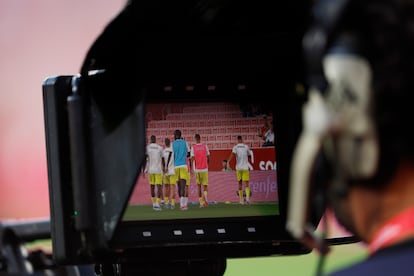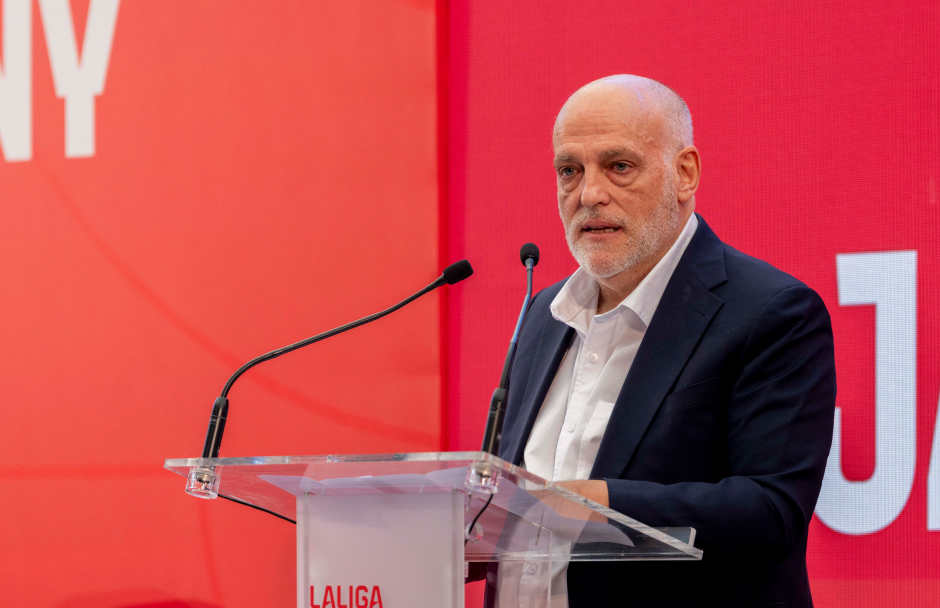The league day begins and millions of people around the world turn their gaze to Spanish professional football. On the pitch, the teams have begun the dispute for the three points. But in the internet universe an increasingly intense battle against hackers has begun. In 2013, LALIGA began its strategy to combat audiovisual fraud through different technological tools that allow detecting any type of illegal broadcast. The traps are becoming more sophisticated. From web pages with hundreds of domains that offer the signal of the matches to social networks such as Telegram, X, Tik Tok or Twitch in which there are groups with thousands of users where you can watch the matches. Something that has required professionals who try to avoid fraud to intensify their efforts to put an end to a scourge that costs LALIGA and its clubs between 600 and 700 million euros annually.
Losses have been mounting in recent years as piracy has spread as an illegal business generating billions for pirates and some tech giants. Guillermo Rodríguez, director of Digital and Audiovisual Antifraud Operations at LALIGA, points out that “Google, X (formerly Twitter), Cloudflare or VPN providers facilitate, directly or indirectly, illicit access to content by making tools available to pirates. “technological technologies for the promotion, distribution and consumption of piracy”.
Every year, fraud grows, says Rodríguez: “The problem is no longer just the number of users who commit audiovisual fraud, because it is highly dynamic, but that Spain is in the top three in Europe of countries in which it is committed. more piracy.”
Sports piracy by country
Percentage of users who resort to piracy once a month
Fountain: Ampere
Fountain: Center for Telecommunications Studies of Latin America (Cetla)
According to the European Intellectual Property Office (EUIPO), in Spain, the majority profile of audiovisual fraudsters corresponds to young users in the 15 to 24 age group. “They are connected to the Internet all day and access the content in a totally illegal way,” explains Rodríguez. This LALIGA official warns that piracy has “penetrated into society”, so there is no single defined profile. These users “take risks, such as not knowing what they are going to do with their data.”
Social networks have also caused the options to watch football illegally to skyrocket. Added to them are users who have been accessing fraudulent content for years through IPTV (Internet Protocol over Television) systems, which can connect to any television or screen and their users pay an annual subscription. “What is changing is the consumption methodology,” says Rodríguez.
More than 50 people work in the department headed by Guillermo Rodríguez, spread across the offices in Madrid and Mexico, to which another anti-piracy laboratory will soon be added that LALIGA will open in the United Arab Emirates. The fight against pirates is “24/7” and especially intense during match days. Its work focuses on detecting the origin from which illegal content is broadcast. To do this, they use tools such as Blackhole, a software that keeps active the tracking of illegal broadcasts from IP addresses, or Lumiére, a software that provides information on web environments and is also used by the Ministry of Culture to minimize the impact of audiovisual fraud.

“Piracy is a very lucrative business not only for pirates, but also for big technology companies”
One of the most important tasks of the LALIGA anti-piracy team is to detect seed IP addresses, the source from which content is fraudulently supplied. With the Blackhole tool they have managed to identify 46,000 IPs of this type around the world, according to LALIGA, mainly in countries such as the United States, Germany, France and the Netherlands. The big problem, Rodríguez points out, is that they are hosted “in companies like Amazon, OVH, Hetzner or Alibaba, legal companies that have headquarters and offices in Madrid or in the European Union, and that are dedicated to hiding and giving privacy to users. pirates so you can’t really see what IP they use.”
“Google has become the perfect ally of pirates”
This complicity of the large technology companies represents, according to LALIGA, an obstacle to the removal of illegal content, which in slang is known as take down. Many times, Rodríguez explains, “they are not interested” in removing them. “On social networks like
The president of LALIGA, Javier Tebas, states emphatically: “Google has become the perfect ally of pirates, facilitating through its inaction the proliferation of illegal content while profiting at the expense of the investment and effort of thousands of companies.” . The head of the sports organization indicates that it is “in the first person the directors of these companies who must be responsible before the law for the damages caused and for not complying with their legal obligations in the fight against piracy and money laundering. Google also does not comply with its obligations against money laundering, facilitating money laundering and the use of piracy as a means of financing multiple criminal organizations.”

How do they benefit?
According to Javier Tebas, “companies like Google or Cloudflare are responsible for not preventing pirates from continuing to profit from this activity. Cloudflare is a technology company that, among its many services, provides concealment or privacy to hackers. More than 50% of the pirate IPs that illegally broadcast LALIGA content use the services of this company to hide the real information of the pirate servers that host the content. Google, for its part, monetizes through advertising and web hosting services from environments linked to piracy, obtaining large income. In the search engine there are illegal streaming websites, some even with countless complaints for intellectual property violations. However, if you are looking to purchase a weapon, logically, no results appear. “They have the technological capacity and, if they want, they could end 80% of piracy.”
In Spain, fines for the sale of fraudulent decoders range between 15,000 and 20,000 euros.
You only need to do a simple Google search to find thousands of web pages selling illegal IPTV services. “There is no will to tackle the problem, it is too lucrative a business,” the president of LALIGA states emphatically. “The criminal action against Google is just the beginning. We will continue in parallel against other large technology companies. It is false that they claim anti-piracy collaboration, it is quite the opposite, they actively collaborate and cooperate in the piracy ecosystem; “We will impose criminal actions against them in more than 50 countries.”
Guillermo Rodríguez, the head of the LALIGA Anti-Digital Fraud and Piracy Office, points out, for his part, a problem with the current legislative framework of the European Union: “It does not set or define specific times for the different internet intermediaries to act against fraud. audiovisual, which complicates the fight against online piracy. In the field of sports competitions, the speed with which intermediaries act is crucial, since exploitation rights are limited to the duration of the event. Removing an illegal transmission after the match is over is useless. Hence, LALIGA is betting on a specific regulation to fight against live piracy.”
In the case of Italy, according to LALIGA, “steps are being taken in the right direction.” When Internet service providers “are aware that an illegal act is being committed, they must immediately inform the judicial or police authority and provide all relevant information under penalty of one year in prison. In addition, they include other actors within this criminal ecosystem in their blocking measures, such as VPNs or Cloudflare.”
Historic ruling against fraud
LALIGA has made very important progress in the battle against fraud in judicial matters, “despite a latent lack of legislation in line with the problem,” according to what they claim. An example of this are claims for damages to those users who consume or redistribute pirated LALIGA content, for example, using P2P (Peer-to-Peer) systems.

“Technology companies could end 80% of piracy”
Another example is the ruling issued by the Argentine Justice on September 20: it ordered the blocking of all domains related to Magis TV, the largest illegal internet television service in Latin America with an average of 55 million monthly visits in the last semester. This cause was promoted by the Alliance against Audiovisual Piracy (Alianza), a group of content and technology providers, pay television broadcasters and audiovisual industry associations whose objective is to combat piracy throughout Latin America. LALIGA, which is part of this alliance, collaborated with this association in this case to demonstrate the theft of content. This is a harsh judicial blow against piracy at a global level, since the resolution forces Google to prevent the use and downloads of the Magis TV application on its Android operating system. The ruling also ruled that the application was blocked, even if it had been downloaded previously, something that had not happened until now.
The recent Argentine ruling is added to those achieved in Spain throughout this year. Three courts in Madrid, Malaga and Barcelona convicted several sellers of fraudulent decoders for a continued crime against the market and consumers. The sentences imposed were between six months and one year in prison, in addition to fines that ranged between 15,000 and 20,000 euros for the guilty. And they will not be the last, as Rodríguez anticipates. “We are preparing a global legal strategy.” This is the number one problem that the audiovisual industry has.”


